Unit4 I used to be afrad of the dark SectionA1a~1c课件
文档属性
| 名称 | Unit4 I used to be afrad of the dark SectionA1a~1c课件 |
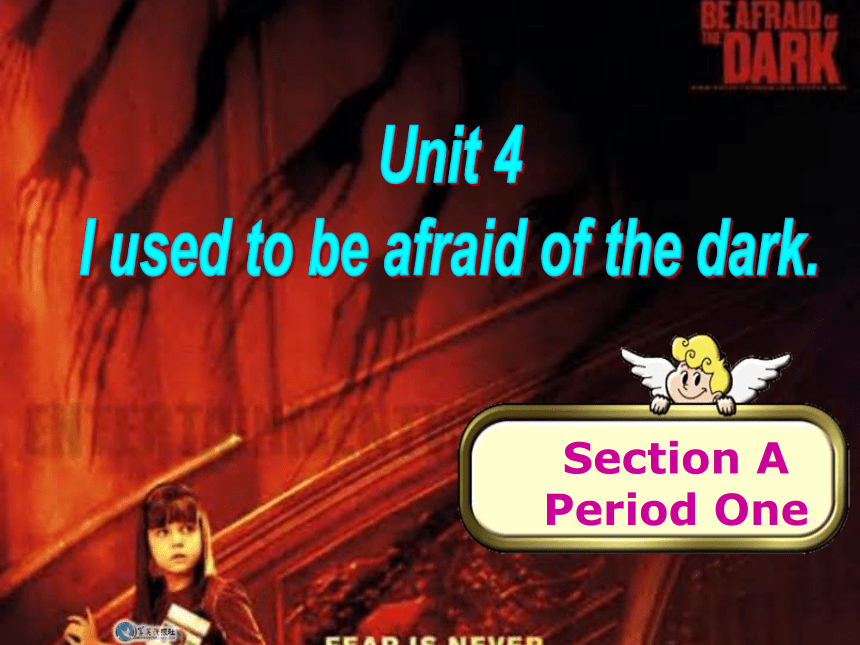
|
|
| 格式 | zip | ||
| 文件大小 | 6.2MB | ||
| 资源类型 | 教案 | ||
| 版本资源 | 人教新目标(Go for it)版 | ||
| 科目 | 英语 | ||
| 更新时间 | 2018-07-08 00:00:00 | ||
图片预览



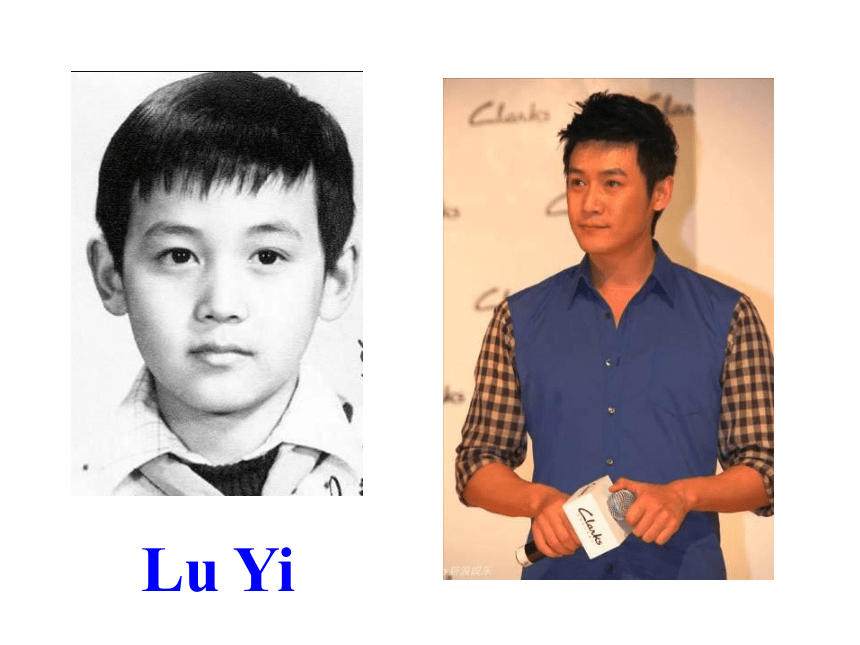
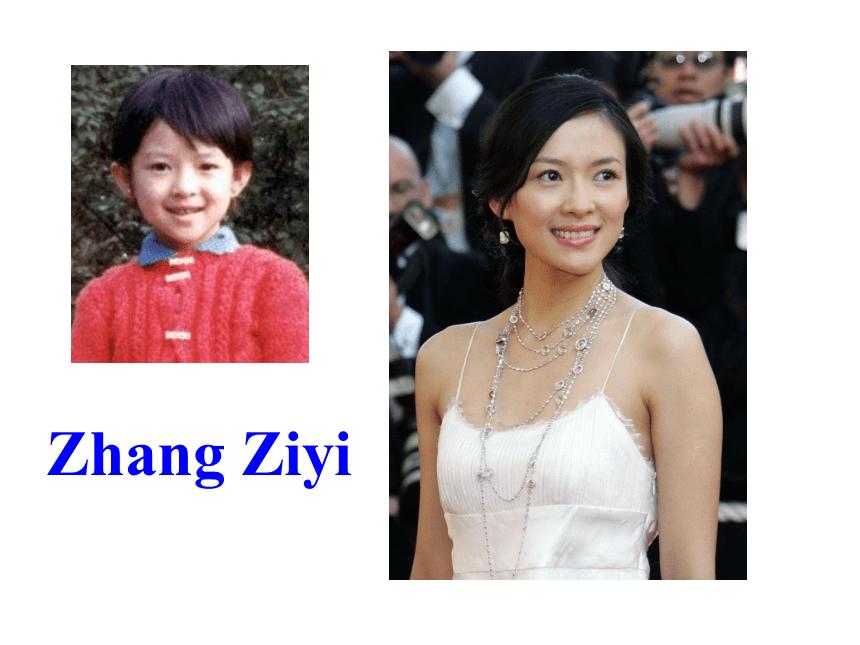

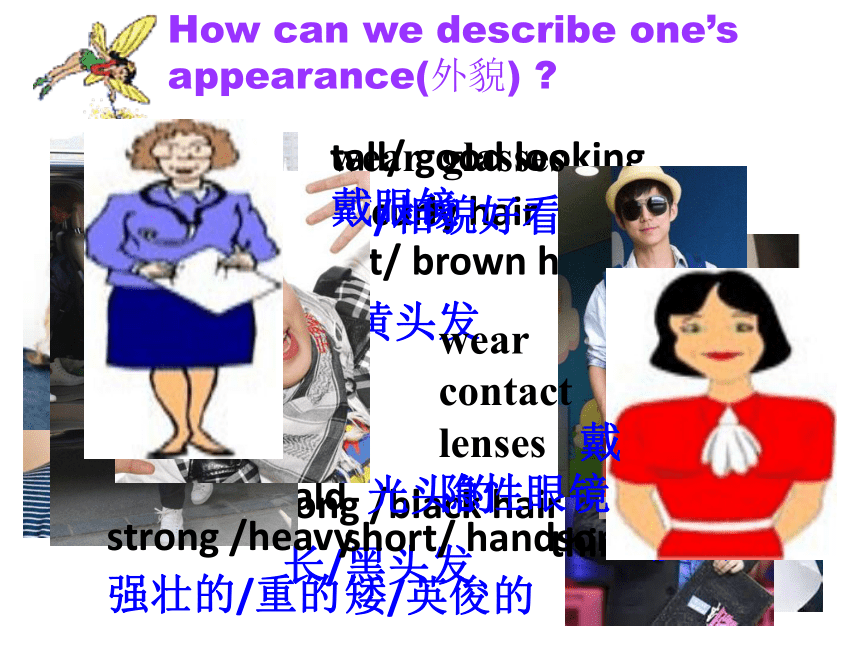
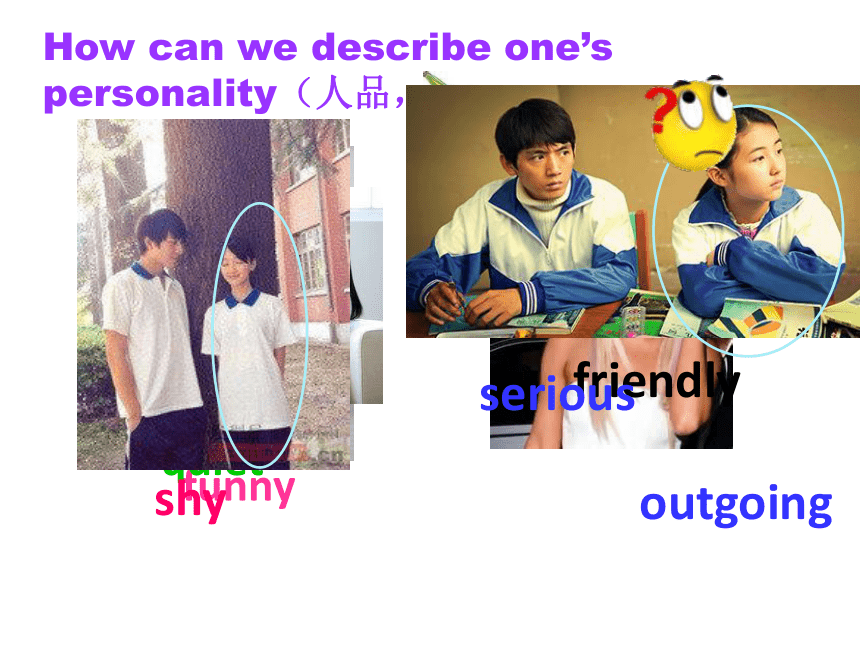
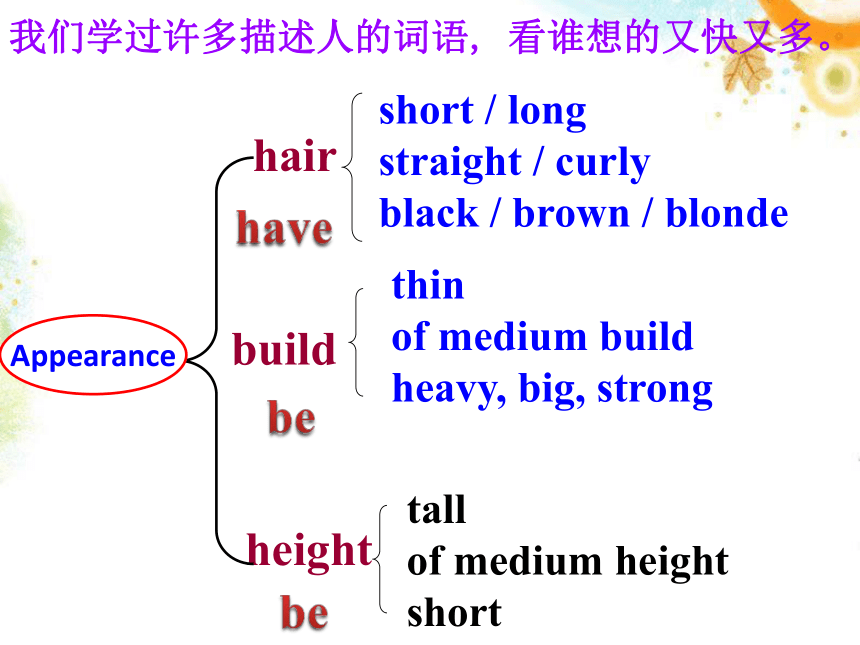
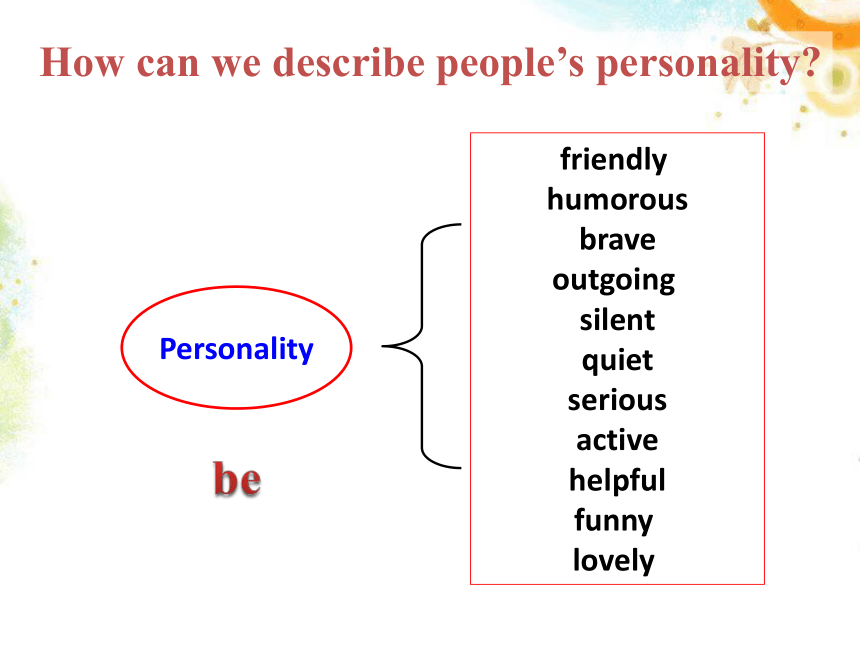
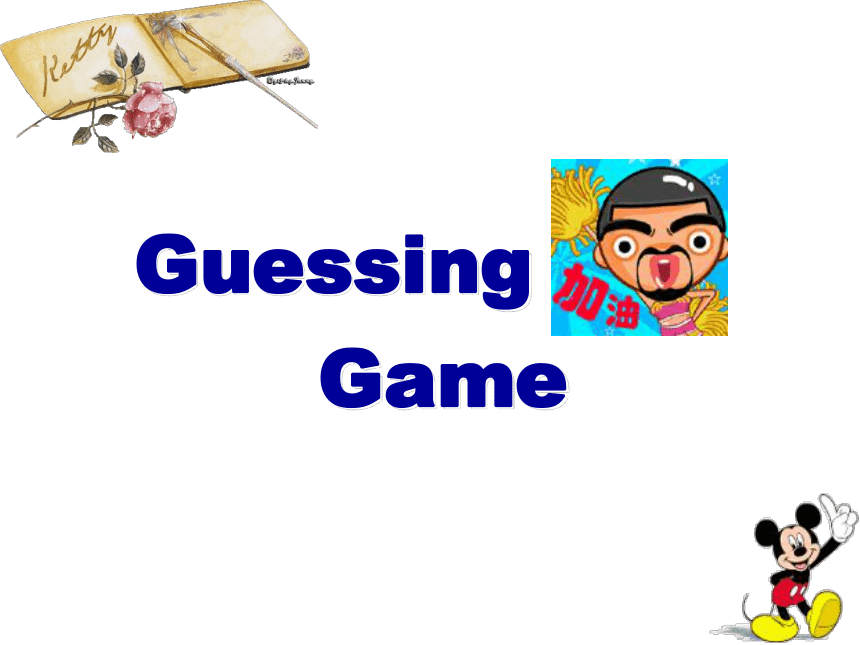
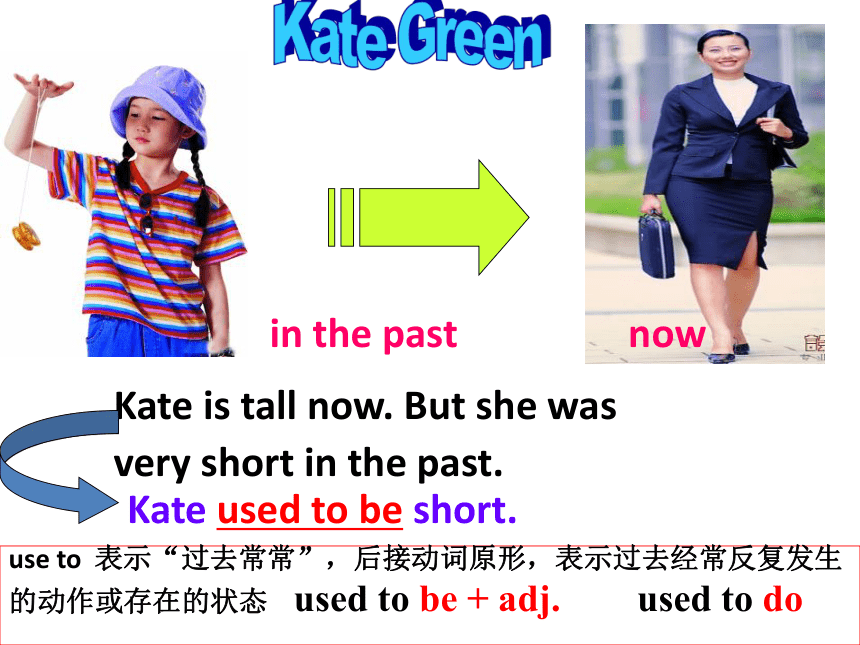
文档简介
课件91张PPT。Unit 4
I used to be afraid of the dark.Section A 1
1a~1c明星一对一你能猜出他/她是哪位明星小时候的样子吗?Zhou XunGuessing GameLu YiZhang ZiyiLu HanToday we’ll talk about what people used to be like.short/ brown hair
短/黄头发long /black hair
长/黑头发How can we describe one’s appearance(外貌) ? curly hair 卷发bald 光头的tall/ good looking
高/相貌好看的short/ handsome
矮/英俊的strong /heavy
强壮的/重的thin 瘦的wear glasses 戴眼镜wear contact lenses 戴隐性眼镜How can we describe one’s personality(人品,个性)? funnyoutgoingquietfriendlyshyseriousshort / long
straight / curly
black / brown / blonde hairbuildthin of medium build heavy, big, strongheighttall of medium height short Appearancehavebebe我们学过许多描述人的词语, 看谁想的又快又多。Personalityfriendly
humorous
brave
outgoing
silent
quiet
serious
active
helpful
funny
lovely How can we describe people’s personality?beGuessing
Gamein the pastnowKate GreenKate is tall now. But she was
very short in the past.Kate used to be short.use to 表示“过去常常”,后接动词原形,表示过去经常反复发生
的动作或存在的状态 used to be + adj. used to do
He used to be short, but now he is tall.Change in appearance short tall VSHe used to be ugly, but now he is really handsome.ugly handsomeVSHe used to be shy but now he is really smart.shy smartstraight hair curly hair
She used to have straight hair, but now she has curly hair.short/tallyoung/oldheavy/thinHe/She used to be/have/wear…, but now he/she is/has/wears ….Make sentencesTry to describe your deskmate. Using “used to”. funny seriousin the pastnow Did he use to be funny?
Yes, he did . He used to be funny.long hairshort hairin the past now Did she use to have short hair?
No, she didn’t. She didn’t use to have short hair.ListeningListen. Bob is seeing some friends for the first time in four years. What did his friends use to look like?1b1. Mario used to be _____. He used to wear ______.
2. Amy used to be _____. She used to have _______ hair.
3. Tina used to have _____ and _____ hair. shortglasses tallshortredcurlyLook at the picture in 1a and make conversations.1cDid Mario use to be short?Yes, he did. He used to be really short.What’s he like now?He’s tall now.PairworkDid Amy use to have short hair?Yes, she did. She used to have short hair. What’s she like now?She has long hair now. Did Tina use to have red hair?Yes, she did. She used to have red and curly hair.What’s she like now?She has straight and blonde hair now. 1. … you used to be short, didn’t you?
(1) used to意为“过去常常;以前经常”,后接动词原形,表示过去的习惯动作或状态,暗指现在此状态不存在了或动作不发生了。
He used to live in Paris.
他过去住在巴黎。
注意:其中的 to 是不定式符号,而不是介词,所以其后只接动词原形(不能接动名词)。Language points(2) used to的一般疑问句、附加疑问句常借助于助动词did / didn’t, 也可用used / usedn’t。
He usedn’t / didn’t use to come.
他过去不常来。
You used to go there, usedn’t / didn’t you?
你过去常到那儿去,是吗?【链接】几个易混结构的比较: He _______ listen to pop music, but now he _______ dancing.
A. is used to; used to
B. use to; is used to
C. used to; is used to
D. used to; used to
【点拨】选C。句意:他过去常听流行音乐,但现在他习惯于跳舞。He used to _______ in the sun, but now he is used to _______ at night. (2007兰州市)
A. read; read B. reading; read
C. read; reading D. reading; reading
【点拨】 used to do sth. 意为“过去常常做某事”,而be / get used to doing sth.意为“习惯于做某事”。根据本题句意“他过去常常在阳光下看书,但现在习惯在夜晚看书。”可知,正确答案为C。2. What’s he like now?
What’s he like?相当于What does he look like?,意思是“他长什么样?”
--- What’s he like?
--- He is tall and thin. What’s ... like ? 还可以用来询问“某事、某物或者某人怎么样?”
What’s spring like in your hometown?
你们家乡的春天是怎样的?
What’s Tim like?
Tim 这个人怎么样?
What’s the weather like today?
今天天气怎样?知识链接Section A 1
1a~1cUse “used to” and “but now” to describe the following picture.ReviewShe used to play soccer, but now she plays tennis.She used to be short, but now she is tall.She used to have long hair, but now
she has short hair.Look at these words and remember them.___ friendly ___ outgoing
___ serious ___ humorous
___ silent ___ active
___ brave ___ quiet
___ helpfulListening2aadj.有幽默感的; 滑稽有趣的adj. 不说话的;
沉默的adj. 有帮助的1. humorous adj.
有幽默感的;滑稽有趣的e.g. He is a kindly and humorous?man.
他是个善良幽默的人。humor (幽默) + ous → 有幽默感的e.g. Peter seems silent today. What’s the matter?
彼特今天似乎很沉默,怎么了?2. silent adj. 不说话的;沉默的silent adj. → silence n. 沉默help n. (帮助) + ful → helpful adj. 3. helpful adj. 有帮助的e.g. The book is really?helpful.
这本书真的很有用。 ListeningListen and check (√) the words you hear.2a___ friendly ___ outgoing
___ serious ___ humorous
___ silent ___ active
___ brave ___ quiet
___ helpfulListen again and complete the sentences about how Paula has changed.2bIn the past1. Paula used to be really _____. She was
always silent in class. She wasn’t very
________. She was never brave enough to ask questions.
2. She got good grade in _______. She was also good in ______. She used to play the ______.outgoingquietsciencemusicpiano1. Now she’s more interested in ______.
She plays ______ almost every day.
She’s also on a _____ team.
2. She still plays the ______ from time to
time. soccersportsswimpianoNow She was always silent in class.
在课堂上她总是很沉默。
silent作形容词,意为“不说话的;沉默的”,其
名词形式为silence (沉默;寂静)
?She was silent when her mother asked
her questions. 她妈妈问她问题时她沉默不语。
Silent 的副词形式是silently (默默的;静静的)
? He went in to the classroom and sat down
silently. 他走进教室静静地坐下来。
2)keep silent意为“保持安静”
? Please keep silent in public places.
在公共场合下请保持安静。She still play the piano from time to time.
她仍然时常弹钢琴。
(1)still 副词,意为“仍然”,用来说明某人或
某物没有变化。still 在句中通常放在实义动词
前,助动词、情态动词、连系动词后面。
? The woman still lives in shanghai.
? He is still in the classroom.
(2) From time to time 意为“时常;有时”相当于
sometimes /at times.
? She goes to the movies from time to time.Pair workPaula used to be really quiet. Make conversations about Paula using the information in 2b. 2cI know. She was always silent in class. She wasn’t very outgoing. She was never brave enough to ask questions. But she was always friendly. She got good grades in exams. And she was really good in music class, too. She used to play the piano. But now she is more interest in sports. She plays soccer almost every day. She still plays the piano from time to time. I know, She’s so active now.Role-play2dWhere are the speakers?At a party.2. What’s the relationship between Alfred and Gina?They’re primary school classmates.3. What are they talking about?They’re talking about how Billy have changed.Read the dialogue in 2d, then answer the questions below.Task 1He used to be so shy and quiet. His face always turned red when he talked to girls.
He used to read in the library every day.
He used to study hard and get good scores on his exams.
He used to wear glasses.
He used to be thin.He’s popular now.
He’s big and strong.Read and fill in the column below. Task 2such为形容词, “这(那)样的”; 主要修饰名词;
so是副词, 意为“这(那)么; 如此地”, 主要修饰形容词或副词。 This party is such a great idea!
He used to be so shy and quiet.
such与so辨析e.g. Do you like such weather?
你喜欢这样的天气吗?
I’m so glad to see you.
很高兴见到你。
He can draw so well.
他画得那么好。当名词前有many, much, few或little等词修饰时, 要用so而不用such。e.g. There are so many / few people in
the hall.
大厅有这么多/这么少的人。
You have so much / little
homework today.
你今天有这么多/这么少的作业。such + a / an +形容词+可数名词单数,
相当于 so +形容词+a / an +可数名词单数,表示“如此……的一个……”。e.g. She is such a lovely girl. =
She is so lovely a girl.
她是这个如此可爱的女孩。用such或so填空。
1) The man told us ____ funny a story.
2) She has _____ a beautiful dress.
3) How can you get ____ much money to buy the car?
4) Don’t go out in ______ cold weather.
5) Don’t eat _____ quickly.so?suchso?suchsoIt’s been three years since we last saw our primary school classmates.
句中的“It’s (It has) been + 时间段 + since从句”是英语中常见的句式,表示“自从……以来有多长时间了”,从句用一般过去时。【运用】单项选择。
— I can hardly believe my eyes. Is that you, Lucy?
— Yes. It has been almost 20 years ______ we were together.
A. since B. before C. after D. until
(2014 湖北黄冈) I used to see him reading in the library every day.
感官动词see可以跟动词-ing形式作宾语补足语,即see sb. doing sth.,表示看见某人正在做某事,强调看到事情正在发生;也可以跟不带to的动词不定式(短语)作宾语补足语,即see sb. do sth.,表示看见某人做某事,强调看到事情发生的整个过程。【运用】单项选择。
(1) When I walked past the park, I saw
some old people ______ Chinese Taiji.
A. do B. did C. doing D. are doing
(2013 山东莱芜)
(2) I saw some boy students ______ basketball when I passed the playground.
A. played B. plays
C. playing D. to play
(2014 贵州安顺)Section A 1
3a~3cReviewTranslate the sentences into
English.1. 马里奥过去很矮,他戴着眼镜。
___________________________________
2. 他现在长什么样子?
_________________ Mario used to be short and wear glasses. What’s he like now?3. 保拉以前很安静,她在班上总是很沉默。
_________________________________
________________________
4. 她总是不够勇敢去问问题。
_______________________________
_________Paula used to be really quiet. She was always silent in class. She was never brave enough to ask
questions.Can you guess what she was like in the past? Do you know the beautiful and outgoing girl?She used to be a shy girl. Yeah. She’s the famous singer Candy Wang.She took up singing to deal with her shyness.As she got better, she was not shy anymore and loved singing in front of crowds. Now she’s the Asian pop star. Do you want to know her story? ____ how Candy’s life has changed
____ Candy’s advice to young people
____ Candy’s background11. Read the article and identify the paragraphs in which the following information appears. Number the information [1-3].23a32. Read the first paragraph and answer the questions.(1) How old is Candy Wang?(2) What was she like?She used to be really shy.She’s 19 years old.(3) Why did she take up singing?To deal with her shyness.(4) What’s she like now?She’s not shy anymore and loves singing in front of crowds. 3. Read the second paragraph and fill in the chart. 1. Being able to travel and meet new people all the time.2. Get tons of attention everywhere she
goes.1. Always have to worry about how she appears to others.2. Have to be careful about what she says or does.3. Don’t have much private time anymore.4. There are always guards around her.4. Read the third paragraph and fill in the blanks.Candy’s advice to young people who want to become famous:
1. People have to be _________ to ____
____ your ______ life.
2. You can never _______ how difficult
the road to _______ is. upgivepreparednormalsuccessimagine3. You really require a lot of ______ and __________ to succeed.
4. Only a very small _______ of people make it to the _____ . numberhard worktalenttopRead the article again and complete the sentences about Candy. She used to be shy, but now she’s not shy ________.
She didn’t use to be _______ in school, but now she gets lots of attention.
She used to ________ with friends, but it is almost impossible now.
She didn’t use to ___________ how she appears to others, but now she does. popularanymore3bworry abouthang out 1. Candy told me that she used to be really shy
and took up singing to deal with her shyness.
坎迪告诉她过去真的很羞涩,开始唱歌是为了
克服自己的羞涩。
(1)take up 此处意为“开始从事”
? He dropped medicine and took up physics.
他放弃医学,开始学物理。
take up的其他用法:
1)“占用” The table takes up too much room.
2)“继续” We took up our journey the next day. Language points(2)deal with 相当于do with, 意为“对付;处理
? How did you deal with the milk?
你是怎么处理那些牛奶的?
? He has learnt to deal with all kinds of difficulties.do with 与deal with 两者都可以用来表示“处
理”do 侧重于对象,deal 侧重于方式方法。在
特殊问句中,do with 与what 连用,deal with
则与How 连用。
? I don’t know how they deal with the problem.
= I don’t know what they do with the problem.2) 动词不定式短语 to deal with 后必须带宾语。
? I don’t know how to deal with it.
我不知道如何处理这件事。(3)shyness 名词,意为“害羞;腼腆”是形
容词shy 加后缀-ness 构成的名词。
? He can’t get over his shyness.
拓展:sad -------- sadness
happy-------- happiness
ill -------- illness
kind -------- kindness 2. As she got better, she dared to sing in front
of her class, and then for the whole school.
随着情况的好转,她敢在全班面前唱歌了,
后来敢为全校的人唱歌了。
( l )dare 此处用作及物动词,意为“敢于;胆
敢”。常构成短语dare to do sth.意为“敢于
做某事”。
? He didn't dare to look at her in the eye.
他不敢正眼看她。
?She dared to walk at night.
她敢走夜路(2)in front of 意为 “在......的前面”。
?There is a little child in front of the house.
房前有一个小孩。
辨析 in front of 与 in the front of
in front of : 在……前面,强调在某一物体外
部的前面。
in the front of :“在…… 的前部”,强调在某一
物体内部的前面
(3)whole 形容词,意为“整个的;全部的”,常
用结构为“the+whole+单数名词”。all也有
此意,但语序不同:all用于冠词、所有格
或其他限定词之前;whole用于冠词、所有
格及其他限定词之后。 all the time 总是; 一直
the whole time 全部的时间
all my life 我的一生
my whole life 我的一生
注意
1)如果没有冠词或其他限定词,whole不能与
单数名词连用
? The whole city was burning.
整个城市都在燃烧。
2)whole一般不与不可数名词及物质名词连用。
(误)the whole money/bread
(正)all the the money/bread3. Now she’s not shy anymore and loves
singing in front of crowds.
现在她再也不羞涩了,并且喜欢当众唱歌。
(1)not ... anymore = no more,意为“不再”。
? He doesn't come late anymore.
= He no more comes late. 他不再迟到了。
(2)crowd此处用作名词,意为“人群;观众;
一帮人”。
?He pushed his way through the crowd.
他在人群中往前挤。
?There were crowds of people at the theater.
剧院里挤满了人。①用作及物动词,意为“挤;挤满;使挤满’。
? Shoppers crowded the street.
街上挤满了购物的人。
? They crowded the bus with passengers.
他们让乘客挤进公共汽车。
② 用作不及物动词,意为“挤;挨;聚集”。
? The young pigs crowed against one another
for warmth.
小猪挤在一起取暖。crowd的其他用法4. … like being able to travel and meet new
people all the time.
…像总是能旅行和结识新朋友。
be able to 与 can 都可以表示 能力,意为
“会;能(够)”。
be able to: 表示经过努力达到目的, 可用于
各种时态
can :表示有能力做某事,仅用于一般现在时
和一般过去时? In the end, only 50 people were able to escape
from the big fire.
最后,只有50人从大火中逃生。
? They can sing the song in English.
他们能用英文唱这首歌。
(2)all the time 意为“一直;总是”,通常位于句末。
? Look! The monkeys jump up and down
all the time.
看! 猴子们一直在上蹿下跳。5. I didn’t use to be popular in school, but now
I get tons of attention everywhere I go.”
过去我在学校里默默无闻,但是现在无论我
走到哪里,都得到太多的关注。
(1)tons of 意为“很多的;大量的”,是英语中
一种夸张的表达方式。ton的本义为“吨”。
? He has been late for school tons of times.
他上学屡次迟到。
(2)get…attention 意为“得到/引起......注意”
? He tried to get the attention of a passing
policeman.
他试图引起一位路过的警察的注意。6. “Well,” she begins slowly, “you have to be
prepared to give up your normal life.
“嗯, ” 她缓缓道来, “你得准备放弃正常的生活。
⑴ prepare 在此处用作及物动词,意为“准备;
预备”。 常用搭配有:prepare sth. “准备某物”
? Our English teacher was preparing the lessons
when I came into the office.
当我进办公室时,我们的英语课老师在备课。
(2) prepare sb sth. 表示“给某人准备某物”
也可用prepare sth for sb. 表示。? She prepared us a nice breakfast.
= She prepared a nice breakfast for us.
她给我们准备了可口的早餐。
(3) prepare sb. for sth 表不“使某人对所准备”。
?She said so because she wanted to prepare
her father for the bad news.
她这样说是因为她想使爸爸对那个坏消息有
所准备。
(4) prepare to do sth. 表示“准备做某事”
? They were preparing to cross the river when
it began to rain.
他们正准备过河,这时突然下雨了。1. Finish the sentences by using the words in the box.Exercises1. Playing the piano well _______ a lot of practice.
2. The ______ won’t let anyone through the gate without a pass. guardrequiresrequire, guard, deal with, background, private3. It’s a _______ garden, not a public one.
4. We know nothing about his ___________.
5. I have a lot of letters to ________ today.privatebackgrounddeal withrequire, guard, deal with, background, private2. Complete the following sentences.1. Rice is the main food in many _____ (Asia) countries.
2. Young people must dare ________ (think), speak up, and act. to thinkAsian3. Mike tried his best to overcome his _________ (shy).
4. Mr. Li took up ____________ (engineer) ten years ago.
5. It’s ____________ (possible) for us to climb up such a high mountain. shynessengineeringimpossible3. Finish the following sentences.1. 我采访二十四岁的亚洲流行歌手茜拉。
I __________ __________ Asian pop star Shila.
2. 她从事歌唱来解决她的害羞问题。
She ____ ____ singing to _____ ____ her shyness. interviewedtook updeal with24-year-old3. 我不再有许多个人时间。
I don’t have _____ _______ time ____ _____.
4. 她过去常和朋友一起闲逛。
She ____ ___ _____ ____ with friends.much private any
moreused to hang out
I used to be afraid of the dark.Section A 1
1a~1c明星一对一你能猜出他/她是哪位明星小时候的样子吗?Zhou XunGuessing GameLu YiZhang ZiyiLu HanToday we’ll talk about what people used to be like.short/ brown hair
短/黄头发long /black hair
长/黑头发How can we describe one’s appearance(外貌) ? curly hair 卷发bald 光头的tall/ good looking
高/相貌好看的short/ handsome
矮/英俊的strong /heavy
强壮的/重的thin 瘦的wear glasses 戴眼镜wear contact lenses 戴隐性眼镜How can we describe one’s personality(人品,个性)? funnyoutgoingquietfriendlyshyseriousshort / long
straight / curly
black / brown / blonde hairbuildthin of medium build heavy, big, strongheighttall of medium height short Appearancehavebebe我们学过许多描述人的词语, 看谁想的又快又多。Personalityfriendly
humorous
brave
outgoing
silent
quiet
serious
active
helpful
funny
lovely How can we describe people’s personality?beGuessing
Gamein the pastnowKate GreenKate is tall now. But she was
very short in the past.Kate used to be short.use to 表示“过去常常”,后接动词原形,表示过去经常反复发生
的动作或存在的状态 used to be + adj. used to do
He used to be short, but now he is tall.Change in appearance short tall VSHe used to be ugly, but now he is really handsome.ugly handsomeVSHe used to be shy but now he is really smart.shy smartstraight hair curly hair
She used to have straight hair, but now she has curly hair.short/tallyoung/oldheavy/thinHe/She used to be/have/wear…, but now he/she is/has/wears ….Make sentencesTry to describe your deskmate. Using “used to”. funny seriousin the pastnow Did he use to be funny?
Yes, he did . He used to be funny.long hairshort hairin the past now Did she use to have short hair?
No, she didn’t. She didn’t use to have short hair.ListeningListen. Bob is seeing some friends for the first time in four years. What did his friends use to look like?1b1. Mario used to be _____. He used to wear ______.
2. Amy used to be _____. She used to have _______ hair.
3. Tina used to have _____ and _____ hair. shortglasses tallshortredcurlyLook at the picture in 1a and make conversations.1cDid Mario use to be short?Yes, he did. He used to be really short.What’s he like now?He’s tall now.PairworkDid Amy use to have short hair?Yes, she did. She used to have short hair. What’s she like now?She has long hair now. Did Tina use to have red hair?Yes, she did. She used to have red and curly hair.What’s she like now?She has straight and blonde hair now. 1. … you used to be short, didn’t you?
(1) used to意为“过去常常;以前经常”,后接动词原形,表示过去的习惯动作或状态,暗指现在此状态不存在了或动作不发生了。
He used to live in Paris.
他过去住在巴黎。
注意:其中的 to 是不定式符号,而不是介词,所以其后只接动词原形(不能接动名词)。Language points(2) used to的一般疑问句、附加疑问句常借助于助动词did / didn’t, 也可用used / usedn’t。
He usedn’t / didn’t use to come.
他过去不常来。
You used to go there, usedn’t / didn’t you?
你过去常到那儿去,是吗?【链接】几个易混结构的比较: He _______ listen to pop music, but now he _______ dancing.
A. is used to; used to
B. use to; is used to
C. used to; is used to
D. used to; used to
【点拨】选C。句意:他过去常听流行音乐,但现在他习惯于跳舞。He used to _______ in the sun, but now he is used to _______ at night. (2007兰州市)
A. read; read B. reading; read
C. read; reading D. reading; reading
【点拨】 used to do sth. 意为“过去常常做某事”,而be / get used to doing sth.意为“习惯于做某事”。根据本题句意“他过去常常在阳光下看书,但现在习惯在夜晚看书。”可知,正确答案为C。2. What’s he like now?
What’s he like?相当于What does he look like?,意思是“他长什么样?”
--- What’s he like?
--- He is tall and thin. What’s ... like ? 还可以用来询问“某事、某物或者某人怎么样?”
What’s spring like in your hometown?
你们家乡的春天是怎样的?
What’s Tim like?
Tim 这个人怎么样?
What’s the weather like today?
今天天气怎样?知识链接Section A 1
1a~1cUse “used to” and “but now” to describe the following picture.ReviewShe used to play soccer, but now she plays tennis.She used to be short, but now she is tall.She used to have long hair, but now
she has short hair.Look at these words and remember them.___ friendly ___ outgoing
___ serious ___ humorous
___ silent ___ active
___ brave ___ quiet
___ helpfulListening2aadj.有幽默感的; 滑稽有趣的adj. 不说话的;
沉默的adj. 有帮助的1. humorous adj.
有幽默感的;滑稽有趣的e.g. He is a kindly and humorous?man.
他是个善良幽默的人。humor (幽默) + ous → 有幽默感的e.g. Peter seems silent today. What’s the matter?
彼特今天似乎很沉默,怎么了?2. silent adj. 不说话的;沉默的silent adj. → silence n. 沉默help n. (帮助) + ful → helpful adj. 3. helpful adj. 有帮助的e.g. The book is really?helpful.
这本书真的很有用。 ListeningListen and check (√) the words you hear.2a___ friendly ___ outgoing
___ serious ___ humorous
___ silent ___ active
___ brave ___ quiet
___ helpfulListen again and complete the sentences about how Paula has changed.2bIn the past1. Paula used to be really _____. She was
always silent in class. She wasn’t very
________. She was never brave enough to ask questions.
2. She got good grade in _______. She was also good in ______. She used to play the ______.outgoingquietsciencemusicpiano1. Now she’s more interested in ______.
She plays ______ almost every day.
She’s also on a _____ team.
2. She still plays the ______ from time to
time. soccersportsswimpianoNow She was always silent in class.
在课堂上她总是很沉默。
silent作形容词,意为“不说话的;沉默的”,其
名词形式为silence (沉默;寂静)
?She was silent when her mother asked
her questions. 她妈妈问她问题时她沉默不语。
Silent 的副词形式是silently (默默的;静静的)
? He went in to the classroom and sat down
silently. 他走进教室静静地坐下来。
2)keep silent意为“保持安静”
? Please keep silent in public places.
在公共场合下请保持安静。She still play the piano from time to time.
她仍然时常弹钢琴。
(1)still 副词,意为“仍然”,用来说明某人或
某物没有变化。still 在句中通常放在实义动词
前,助动词、情态动词、连系动词后面。
? The woman still lives in shanghai.
? He is still in the classroom.
(2) From time to time 意为“时常;有时”相当于
sometimes /at times.
? She goes to the movies from time to time.Pair workPaula used to be really quiet. Make conversations about Paula using the information in 2b. 2cI know. She was always silent in class. She wasn’t very outgoing. She was never brave enough to ask questions. But she was always friendly. She got good grades in exams. And she was really good in music class, too. She used to play the piano. But now she is more interest in sports. She plays soccer almost every day. She still plays the piano from time to time. I know, She’s so active now.Role-play2dWhere are the speakers?At a party.2. What’s the relationship between Alfred and Gina?They’re primary school classmates.3. What are they talking about?They’re talking about how Billy have changed.Read the dialogue in 2d, then answer the questions below.Task 1He used to be so shy and quiet. His face always turned red when he talked to girls.
He used to read in the library every day.
He used to study hard and get good scores on his exams.
He used to wear glasses.
He used to be thin.He’s popular now.
He’s big and strong.Read and fill in the column below. Task 2such为形容词, “这(那)样的”; 主要修饰名词;
so是副词, 意为“这(那)么; 如此地”, 主要修饰形容词或副词。 This party is such a great idea!
He used to be so shy and quiet.
such与so辨析e.g. Do you like such weather?
你喜欢这样的天气吗?
I’m so glad to see you.
很高兴见到你。
He can draw so well.
他画得那么好。当名词前有many, much, few或little等词修饰时, 要用so而不用such。e.g. There are so many / few people in
the hall.
大厅有这么多/这么少的人。
You have so much / little
homework today.
你今天有这么多/这么少的作业。such + a / an +形容词+可数名词单数,
相当于 so +形容词+a / an +可数名词单数,表示“如此……的一个……”。e.g. She is such a lovely girl. =
She is so lovely a girl.
她是这个如此可爱的女孩。用such或so填空。
1) The man told us ____ funny a story.
2) She has _____ a beautiful dress.
3) How can you get ____ much money to buy the car?
4) Don’t go out in ______ cold weather.
5) Don’t eat _____ quickly.so?suchso?suchsoIt’s been three years since we last saw our primary school classmates.
句中的“It’s (It has) been + 时间段 + since从句”是英语中常见的句式,表示“自从……以来有多长时间了”,从句用一般过去时。【运用】单项选择。
— I can hardly believe my eyes. Is that you, Lucy?
— Yes. It has been almost 20 years ______ we were together.
A. since B. before C. after D. until
(2014 湖北黄冈) I used to see him reading in the library every day.
感官动词see可以跟动词-ing形式作宾语补足语,即see sb. doing sth.,表示看见某人正在做某事,强调看到事情正在发生;也可以跟不带to的动词不定式(短语)作宾语补足语,即see sb. do sth.,表示看见某人做某事,强调看到事情发生的整个过程。【运用】单项选择。
(1) When I walked past the park, I saw
some old people ______ Chinese Taiji.
A. do B. did C. doing D. are doing
(2013 山东莱芜)
(2) I saw some boy students ______ basketball when I passed the playground.
A. played B. plays
C. playing D. to play
(2014 贵州安顺)Section A 1
3a~3cReviewTranslate the sentences into
English.1. 马里奥过去很矮,他戴着眼镜。
___________________________________
2. 他现在长什么样子?
_________________ Mario used to be short and wear glasses. What’s he like now?3. 保拉以前很安静,她在班上总是很沉默。
_________________________________
________________________
4. 她总是不够勇敢去问问题。
_______________________________
_________Paula used to be really quiet. She was always silent in class. She was never brave enough to ask
questions.Can you guess what she was like in the past? Do you know the beautiful and outgoing girl?She used to be a shy girl. Yeah. She’s the famous singer Candy Wang.She took up singing to deal with her shyness.As she got better, she was not shy anymore and loved singing in front of crowds. Now she’s the Asian pop star. Do you want to know her story? ____ how Candy’s life has changed
____ Candy’s advice to young people
____ Candy’s background11. Read the article and identify the paragraphs in which the following information appears. Number the information [1-3].23a32. Read the first paragraph and answer the questions.(1) How old is Candy Wang?(2) What was she like?She used to be really shy.She’s 19 years old.(3) Why did she take up singing?To deal with her shyness.(4) What’s she like now?She’s not shy anymore and loves singing in front of crowds. 3. Read the second paragraph and fill in the chart. 1. Being able to travel and meet new people all the time.2. Get tons of attention everywhere she
goes.1. Always have to worry about how she appears to others.2. Have to be careful about what she says or does.3. Don’t have much private time anymore.4. There are always guards around her.4. Read the third paragraph and fill in the blanks.Candy’s advice to young people who want to become famous:
1. People have to be _________ to ____
____ your ______ life.
2. You can never _______ how difficult
the road to _______ is. upgivepreparednormalsuccessimagine3. You really require a lot of ______ and __________ to succeed.
4. Only a very small _______ of people make it to the _____ . numberhard worktalenttopRead the article again and complete the sentences about Candy. She used to be shy, but now she’s not shy ________.
She didn’t use to be _______ in school, but now she gets lots of attention.
She used to ________ with friends, but it is almost impossible now.
She didn’t use to ___________ how she appears to others, but now she does. popularanymore3bworry abouthang out 1. Candy told me that she used to be really shy
and took up singing to deal with her shyness.
坎迪告诉她过去真的很羞涩,开始唱歌是为了
克服自己的羞涩。
(1)take up 此处意为“开始从事”
? He dropped medicine and took up physics.
他放弃医学,开始学物理。
take up的其他用法:
1)“占用” The table takes up too much room.
2)“继续” We took up our journey the next day. Language points(2)deal with 相当于do with, 意为“对付;处理
? How did you deal with the milk?
你是怎么处理那些牛奶的?
? He has learnt to deal with all kinds of difficulties.do with 与deal with 两者都可以用来表示“处
理”do 侧重于对象,deal 侧重于方式方法。在
特殊问句中,do with 与what 连用,deal with
则与How 连用。
? I don’t know how they deal with the problem.
= I don’t know what they do with the problem.2) 动词不定式短语 to deal with 后必须带宾语。
? I don’t know how to deal with it.
我不知道如何处理这件事。(3)shyness 名词,意为“害羞;腼腆”是形
容词shy 加后缀-ness 构成的名词。
? He can’t get over his shyness.
拓展:sad -------- sadness
happy-------- happiness
ill -------- illness
kind -------- kindness 2. As she got better, she dared to sing in front
of her class, and then for the whole school.
随着情况的好转,她敢在全班面前唱歌了,
后来敢为全校的人唱歌了。
( l )dare 此处用作及物动词,意为“敢于;胆
敢”。常构成短语dare to do sth.意为“敢于
做某事”。
? He didn't dare to look at her in the eye.
他不敢正眼看她。
?She dared to walk at night.
她敢走夜路(2)in front of 意为 “在......的前面”。
?There is a little child in front of the house.
房前有一个小孩。
辨析 in front of 与 in the front of
in front of : 在……前面,强调在某一物体外
部的前面。
in the front of :“在…… 的前部”,强调在某一
物体内部的前面
(3)whole 形容词,意为“整个的;全部的”,常
用结构为“the+whole+单数名词”。all也有
此意,但语序不同:all用于冠词、所有格
或其他限定词之前;whole用于冠词、所有
格及其他限定词之后。 all the time 总是; 一直
the whole time 全部的时间
all my life 我的一生
my whole life 我的一生
注意
1)如果没有冠词或其他限定词,whole不能与
单数名词连用
? The whole city was burning.
整个城市都在燃烧。
2)whole一般不与不可数名词及物质名词连用。
(误)the whole money/bread
(正)all the the money/bread3. Now she’s not shy anymore and loves
singing in front of crowds.
现在她再也不羞涩了,并且喜欢当众唱歌。
(1)not ... anymore = no more,意为“不再”。
? He doesn't come late anymore.
= He no more comes late. 他不再迟到了。
(2)crowd此处用作名词,意为“人群;观众;
一帮人”。
?He pushed his way through the crowd.
他在人群中往前挤。
?There were crowds of people at the theater.
剧院里挤满了人。①用作及物动词,意为“挤;挤满;使挤满’。
? Shoppers crowded the street.
街上挤满了购物的人。
? They crowded the bus with passengers.
他们让乘客挤进公共汽车。
② 用作不及物动词,意为“挤;挨;聚集”。
? The young pigs crowed against one another
for warmth.
小猪挤在一起取暖。crowd的其他用法4. … like being able to travel and meet new
people all the time.
…像总是能旅行和结识新朋友。
be able to 与 can 都可以表示 能力,意为
“会;能(够)”。
be able to: 表示经过努力达到目的, 可用于
各种时态
can :表示有能力做某事,仅用于一般现在时
和一般过去时? In the end, only 50 people were able to escape
from the big fire.
最后,只有50人从大火中逃生。
? They can sing the song in English.
他们能用英文唱这首歌。
(2)all the time 意为“一直;总是”,通常位于句末。
? Look! The monkeys jump up and down
all the time.
看! 猴子们一直在上蹿下跳。5. I didn’t use to be popular in school, but now
I get tons of attention everywhere I go.”
过去我在学校里默默无闻,但是现在无论我
走到哪里,都得到太多的关注。
(1)tons of 意为“很多的;大量的”,是英语中
一种夸张的表达方式。ton的本义为“吨”。
? He has been late for school tons of times.
他上学屡次迟到。
(2)get…attention 意为“得到/引起......注意”
? He tried to get the attention of a passing
policeman.
他试图引起一位路过的警察的注意。6. “Well,” she begins slowly, “you have to be
prepared to give up your normal life.
“嗯, ” 她缓缓道来, “你得准备放弃正常的生活。
⑴ prepare 在此处用作及物动词,意为“准备;
预备”。 常用搭配有:prepare sth. “准备某物”
? Our English teacher was preparing the lessons
when I came into the office.
当我进办公室时,我们的英语课老师在备课。
(2) prepare sb sth. 表示“给某人准备某物”
也可用prepare sth for sb. 表示。? She prepared us a nice breakfast.
= She prepared a nice breakfast for us.
她给我们准备了可口的早餐。
(3) prepare sb. for sth 表不“使某人对所准备”。
?She said so because she wanted to prepare
her father for the bad news.
她这样说是因为她想使爸爸对那个坏消息有
所准备。
(4) prepare to do sth. 表示“准备做某事”
? They were preparing to cross the river when
it began to rain.
他们正准备过河,这时突然下雨了。1. Finish the sentences by using the words in the box.Exercises1. Playing the piano well _______ a lot of practice.
2. The ______ won’t let anyone through the gate without a pass. guardrequiresrequire, guard, deal with, background, private3. It’s a _______ garden, not a public one.
4. We know nothing about his ___________.
5. I have a lot of letters to ________ today.privatebackgrounddeal withrequire, guard, deal with, background, private2. Complete the following sentences.1. Rice is the main food in many _____ (Asia) countries.
2. Young people must dare ________ (think), speak up, and act. to thinkAsian3. Mike tried his best to overcome his _________ (shy).
4. Mr. Li took up ____________ (engineer) ten years ago.
5. It’s ____________ (possible) for us to climb up such a high mountain. shynessengineeringimpossible3. Finish the following sentences.1. 我采访二十四岁的亚洲流行歌手茜拉。
I __________ __________ Asian pop star Shila.
2. 她从事歌唱来解决她的害羞问题。
She ____ ____ singing to _____ ____ her shyness. interviewedtook updeal with24-year-old3. 我不再有许多个人时间。
I don’t have _____ _______ time ____ _____.
4. 她过去常和朋友一起闲逛。
She ____ ___ _____ ____ with friends.much private any
moreused to hang out
同课章节目录
- Unit 1 How can we become good learners.
- Section A
- Section B
- Unit 2 I think that mooncakes are delicious!
- Section A
- Section B
- Unit 3 Could you please tell me where the restroom
- Section A
- Section B
- Unit 4 I used to be afraid of the dark.
- Section A
- Section B
- Unit 5 What are the shirts made of?
- Section A
- Section B
- Review of Units 1-5
- Unit 6 When was it invented?
- Section A
- Section B
- Unit 7 Teenagers should be allowed to choose their
- Section A
- Section B
- Unit 8 It must belong to Carla.
- Section A
- Section B
- Unit 9 I like music that I can dance to.
- Section A
- Section B
- Unit 10 You're supposed to shake hands.
- Section A
- Section B
- Review of Units 6-10
- Unit 11 Sad movies make me cry.
- Section A
- Section B
- Unit 12 Life is full of the unexpected
- Section A
- Section B
- Unit 13 We're trying to save the earth!
- Section A
- Section B
- Unit 14 I remember meeting all of you in Grade 7.
- Section A
- Section B
- Review of Units 11-14
